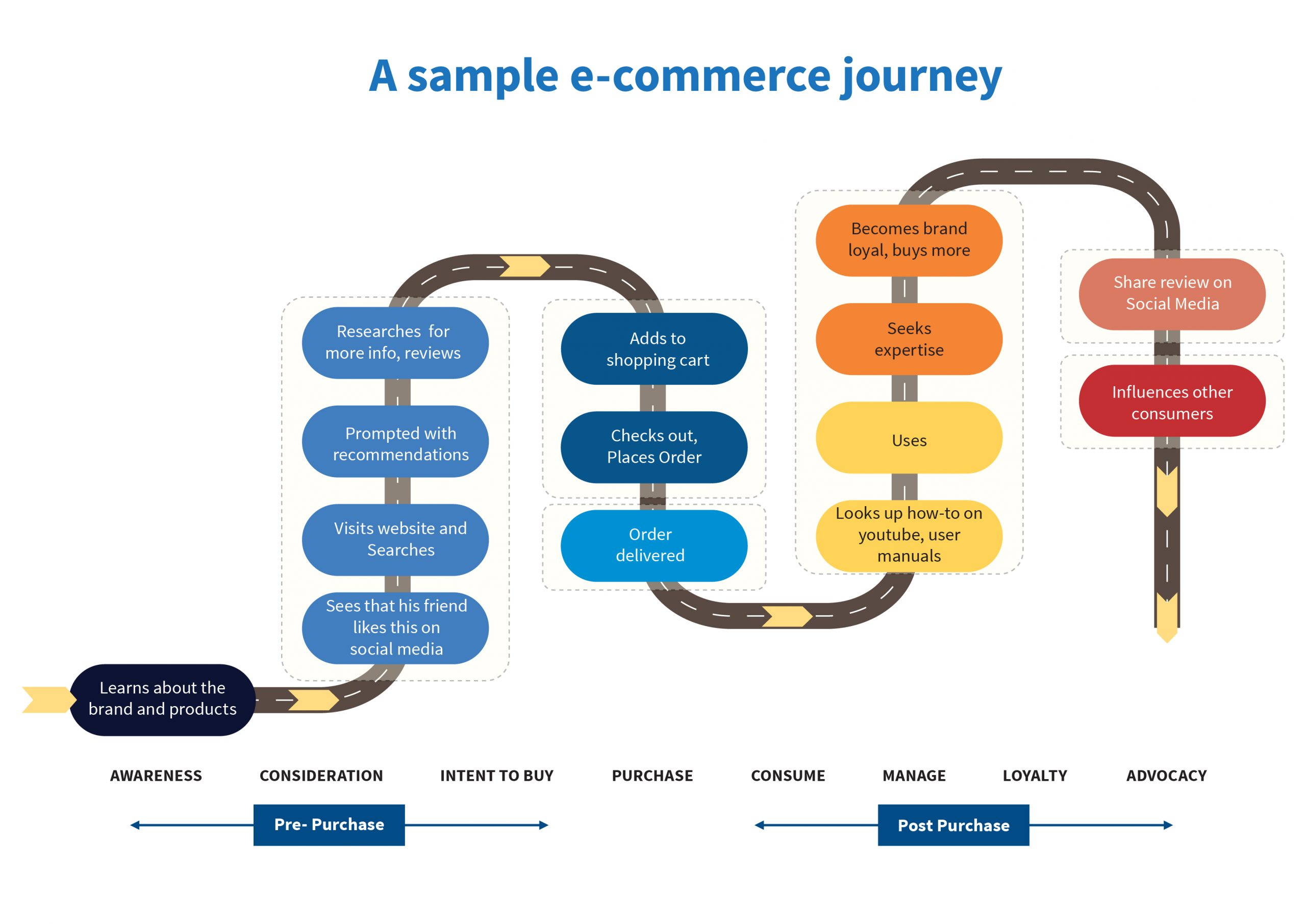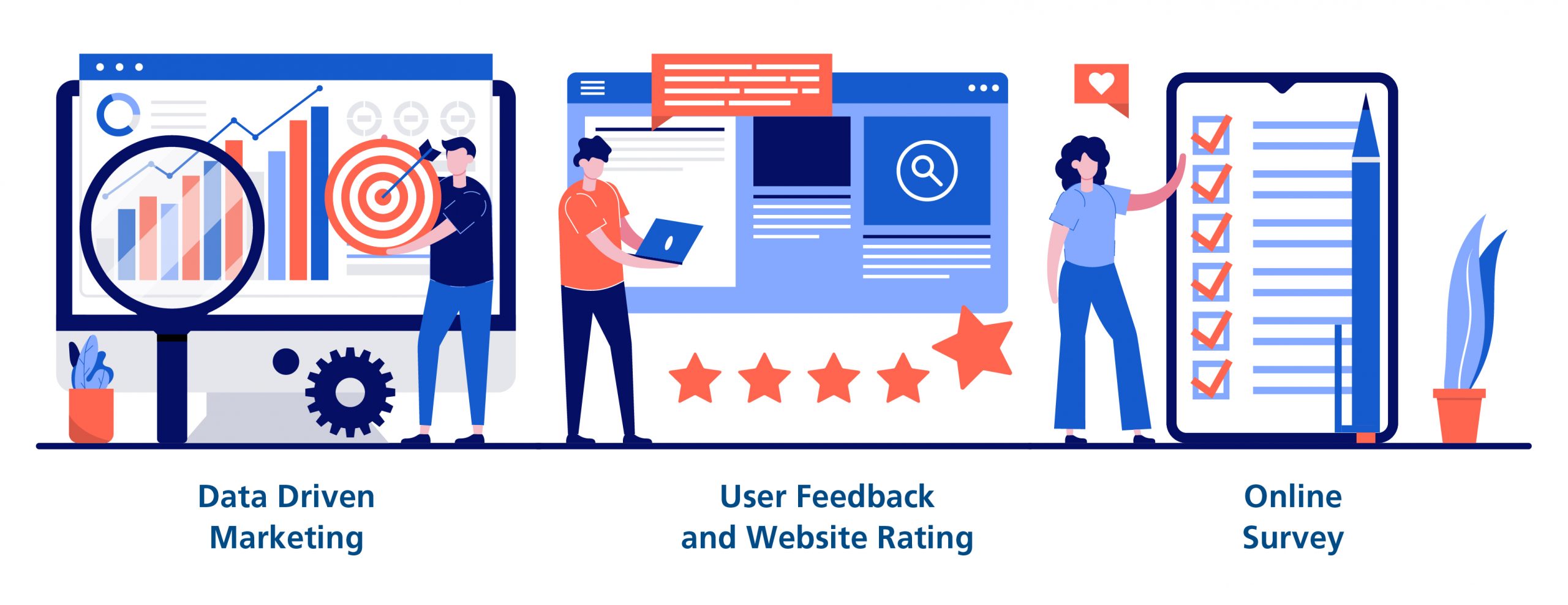Beyond the Sale: Four ways Gen AI is Revolutionizing e-Commerce Post-Purchase Experiences
In my last blog Elevating Shopping Experience: 5 Ways Gen AI is Revolutionizing e-Commerce Product Discovery, we discovered how Gen AI is impacting the e-commerce shopping experience, thus improving conversions and consumer engagement. But most e-commerce journeys do not end at the ‘Buy’ button. Post-purchase experience is a pivotal phase in fostering customer loyalty, shaping a brand’s perception and image, and building a trusted community of buyers.
Here’s a sample of the e-commerce customer journey:

Post-purchase journey kicks in from the moment a customer makes a purchase. From the customer tracking the order delivery, or learning how to install and use a product, writing a review about the order, or receiving email nudges to buy complementary products or schedule maintenance, businesses can leverage Gen AI in e-commerce to convert each customer touchpoint into a positive engagement opportunity.
Here are four ways Gen AI in e-commerce can revolutionize post-purchase experience:
Seamless customer support:
Gen AI-powered chatbots can provide instant, personalized responses to customer queries. These bots fetch data from all relevant sources (FAQs, knowledge manuals, CRM/customer data platform, PIM, OMS, etc.) to provide accurate and quality responses.With Gen AI’s natural language processing (NLP) ability, the chatbots provide natural, human-like responses and offer real-time multi-lingual translations. The tone of the responses can be fine-tuned to reflect the brand image and the business domain (e.g. technical, medical, etc.).

e-commerce chatbot
Gen AI can categorize and summarize customer interactions for future analysis and references. Furthermore, Gen AI uses Sentiment Analysis to gauge the tone of a customer interaction and tailor responses accordingly. It also provides personalized offers or escalates the issue to human agents.
Apart from enhanced customer experience and reduced response time, this use case also has tremendous potential to reduce costs and improve resource optimization.
According to a McKinsey report, generative AI could reduce the volume of human-serviced contacts by up to 50%, depending on a company’s existing level of automation. A 2023 report from Gartner estimated that businesses using AI in customer service saw a 33% reduction in customer service costs.
Nykaa, a $13 billion Indian fashion and beauty e-commerce retailer, automated customer queries ranging from cancellations, returns, shipping inquiries, replacement concerns, refunds, and payment hassles for over half a million customers on its app. Using Verloop.io’s eCommerce chatbot, Nykaa boosted its engagement by 2.2x.
Community building and earned media:
There is no doubt about social media’s potential to make or break a brand’s perception. Social media platforms are the leaders in user-generated content.Today’s customers do not shy away from posting reviews about their purchases (whether positive or negative) on their personal social media handles or those of the brand’s. This type of content is called earned media. Through Sentiment Analysis, Gen AI can not only listen to the various reviews but also take the next best action. For example, it canprovide personalized responses or escalate an issue to the appropriate team or agent.To leverage the potential of earned media, brands should encourage and incentivize their customers to post positive reviews on social media. AI can also identify potential influencers and engage with them, forming a community of ambassadors, who will in turn attract new customers.
Enhance customer loyalty and NPS:
While traditional loyalty programs rewarded purchases or transactions (converted into loyalty points), in today’s era, the definition of customer loyalty extends to post-purchase engagements as well, fostering long-term brand loyalty and enhancing net promoter score (NPS).For example, Gen AI can be used to track and incentivize customers who post positive reviews or share product recommendations on different channels.As businesses leverage Gen AI in e-commerce to analyze vast datasets and understand customer preferences, they can create loyalty programs that resonate with each customer segment.Some examples of using Gen AI in e-commerce to increase loyalty include:
- Automated follow-up emails after purchase or after customer interactions, to collect feedback and gauge customer sentiment, and proactive responses to feedback or queries.
- Gamified loyalty programs and interactive experiences that engage customers through challenges, rewards, and competitions.
- Customized product or service offerings based on customer preferences.
The subscription box service Birchbox has harnessed Gen AI to fine-tune its offerings.
Analyzing post-purchase emails, customer feedback and reviews, and social media posts, they have updated their monthly offerings, resulting in increased customer loyalty and retention.
Predictive analytics for customer preferences:
Market research and post-purchase data analysis have been performed for ages by brands to understand customer behavior. Predictive analytics has also been used for years now, thanks to advanced data analytics tools. Gen AI takes the capability to the next level, by delving into historical and real-time, structured and unstructured data collected from different sources and touchpoints, and providing actionable insights into customer behavior, purchasing patterns, and factors influencing their purchase decisions.Furthermore, Gen AI processes these vast datasets to predict emerging patterns and future needs, which can help businesses adapt their products, offerings, and marketing strategies.These insights also enable businesses to optimize inventory, avoiding overstocking or understocking issues.
Zara, a global fashion retailer, has embraced Gen AI to revolutionize its approach to inventory and product offerings. By analyzing real-time fashion trends, customer feedback and preferences, and market dynamics, Zara uses predictive analytics to swiftly adapt its inventory and product assortments. This agile strategy allows Zara to introduce new styles quickly, respond to emerging trends, and minimize the risk of holding unsold inventory.

Gen AI uses predictive data analytics
Conclusion
From seamlessly personalized customer support to anticipating future customer needs and trends using predictive analytics, from listening to the voice of customers, to actively engaging with them and building a community of brand advocates, Gen AI in e-commerce is having a transformative impact on post-purchase experience. Thus, it is paving the way for increased customer loyalty and sustained success. This transformative impact is merely a glimpse of the potential that Gen AI has in shaping the future of e-commerce.
References
- How to Access Generative AI in Customer Service and Support, 1 August 2023: https://www.gartner.com/en/documents/4590799
- eCommerce Chatbot: 7 Ways To Boost Engagement, Sales, Customer Support, Gaurav Singh, 18 July 2022: https://verloop.io/blog/the-ultimate-guide-ecommerce-chatbots/
- Customer Service and Support Leaders Should Assess Generative AI Technology Options to Enhance Their Organization’s Function, Uma Challa, 3 August 2023: https://www.gartner.com/en/newsroom/press-releases/2023-08-03-customer-service-and-support-leaders-should-assess-generative-ai-technology-options-to-enhance-their-organizations-function
- The economic potential of generative AI: The next productivity frontier, McKinsey Digital, 14 June 2023: https://www.mckinsey.com/capabilities/mckinsey-digital/our-insights/the-economic-potential-of-generative-ai-the-next-productivity-frontier#/
More from Lavina Malani
Generative AI (Gen AI) and LLM (Large Language Models), the technology behind it, are re-shaping…
In today's fast-paced world of e-commerce, consumers are seeking seamless, personalized, and…
Latest Blogs
Core banking platforms like Temenos Transact, FIS® Systematics, Fiserv DNA, Thought Machine,…
We are at a turning point for healthcare. The complexity of healthcare systems, strict regulations,…
Clinical trials evaluate the efficacy and safety of a new drug before it comes into the market.…
Introduction In the upstream oil and gas industry, drilling each well is a high-cost, high-risk…




